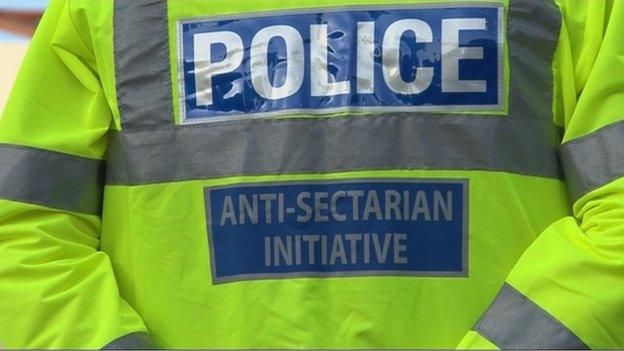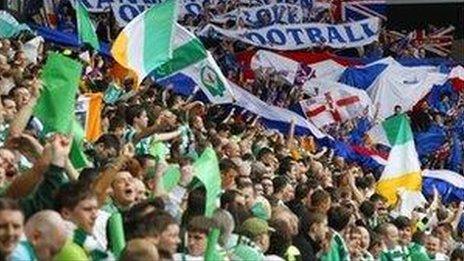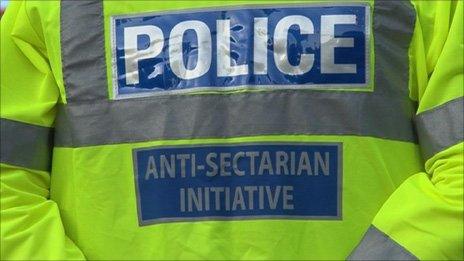Hate crimes fall at Scottish football matches
- Published

Falls have been recorded in the number of sectarian incidents
The number of sectarian incidents recorded at Scottish football matches fell by 40% last season, according to Crown Office figures.
The total number of offences, under new legislation which criminalised religious hatred connected to football, dropped from 267 to 203 in 2013/14, external.
Officials said this may account for a 15% drop in all offences with a religious aggravation.
The figure of 587 was down from 689 the previous year and 898 in 2011/12.
The totals for the preceding five years were relatively stable, with between 600 and 700 charges reported each year.
In 51% of the football-related cases, the accused was affiliated with either Rangers or Celtic.
'Small minority'
In all, there were 635 charges relating to religious prejudice in Scotland when general offences of religious hatred were added to those under the new legislation - the Offensive Behaviour at Football and Threatening Communications (Scotland) Act 2012.
That was a 17% reduction on the previous 12 months.
The government said it was committed to review the football legislation after two years, but said the figures showed strong action was being taken to tackle the actions of the "small minority" of fans who indulge in offensive behaviour at matches.
As in previous years, Roman Catholicism and Protestantism were most often the religions that were the subject of abuse.
There was an increase in the proportion of charges which related to Catholicism - from 57% in 2012/13 to 63% in the subsequent 12 months - although the number of offences fell.
Offences relating to Protestantism remained steady at 29% - also with a reduced number.
In 29% per cent of the incidents, the accused had affiliations with Rangers. Celtic fans accounted for 22%.
More than a quarter (28%) referred to support for terrorist organisations.
Advisory group
The legislation has proved controversial with football clubs and fans who have complained it does not specify exactly what constitutes offensive behaviour, including which songs or chants could contravene the law.
Religious hate crimes fell by 17% overall, which ministers said was testament to hard work taking place to tackle these offences.
The government said it had invested £9m between 2012 and 2015 in community projects and set up an independent advisory group to tackle the scourge of sectarianism.
The statistics also revealed rises in sexual orientation aggravated crime, which were up by up 22%; disability aggravated offences, which increased by 12%; and charges with an aggravation of transgender identity. However, in each case the numbers involved were low.
Hate crimes
Equalities Secretary Shona Robison condemned those increases and said an awareness campaign had been launched to encourage reporting of such crimes, which included the establishment of third party reporting centres across Scotland.
"No-one should have to face discrimination or prejudice in any form in 21st Century Scotland," she said.
"The more we talk about it, the easier it will be for people to report hate crimes to the authorities.
"We are not becoming more intolerant as a society, but we are becoming less tolerant of those who hold prejudiced beliefs."
Jan Savage, head of campaigns and policy at the charity Enable Scotland said the rise in offences against disabled people was disappointing.
But she said: "More and more disabled people are exercising their rights to report hate crimes and reclaim their communities and the right to feel safe.
"What this also tells us is that there is a real need to tackle the root causes of disability related hate crime, and work harder to change attitudes about disability."
- Published5 November 2013

- Published14 June 2013

- Published2 March 2012
